|
|
|
Sort Order |
|
|
|
Items / Page
|
|
|
|
|
|
|
| Srl | Item |
| 1 |
ID:
166989
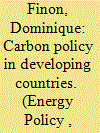

|
|
|
|
|
| Summary/Abstract |
Carbon pricing might not be appropriate as the main element of the carbon policy package in emerging and developing countries (DCs), because the political economy constraints are greater than in developed countries. Non-price instruments and policies such as efficiency standards, market-oriented regulation, subsidies for clean technologies and public programs involving low carbon infrastructure should be preferentially developed to deal with market and regulatory failures, which are more widespread than in developed countries. These approaches are most effective in orientating technology and infrastructure, the principal means to achieving the mitigation imperative in DCs. Moreover, even if, in theory, policy packages using non-price instruments are less socially efficient than those focused on carbon pricing, they allow governments to circumvent political economy constraints, because their costs to consumers and citizens are not generalized and tend to be much less visible, while their redistributive effects are, if appropriately designed, generally not too regressive. In the end, developing a carbon policy that emphasizes non-price instruments and measures will pave the way to leverage carbon pricing as the main pillar of their future carbon policy in long term.
|
|
|
|
|
|
|
|
|
|
|
|
|
|
|
|
| 2 |
ID:
148146


|
|
|
|
|
| Summary/Abstract |
VICTOR MENALDO discusses the effects of democracy on redistribution in Latin America. He challenges the view that democratization has been a credible commitment to redistribution in the region. He argues that redistribution is unlikely if authoritarian elites can manipulate the rules of the democratic game.
|
|
|
|
|
|
|
|
|
|
|
|
|
|
|
|
| 3 |
ID:
138424


|
|
|
|
|
| Summary/Abstract |
The knowledge economy, deindustrialization, and the decline of Fordism have undermined the economic complementarities that once existed between skilled and semiskilled workers. The result has everywhere been a decline in coordinated wage bargaining and unionization and a notable rise in labor market inequality. Yet, the political responses have been very different across advanced democracies. While labor markets for part-time and temporary employment have been deregulated across the board, some countries have compensated losers through increased cash transfers and active labor market programs and others have allowed inequality and insider-outsider divisions to grow deeper. The article argues that the divergent government responses reflect differences in underlying electoral coalitions, and that these in turn mirror the structure of party and electoral systems. The authors support their argument with evidence for government responses to economic shocks in the period 1980 to 2010.
|
|
|
|
|
|
|
|
|
|
|
|
|
|
|
|
| 4 |
ID:
082208
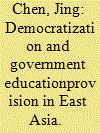

|
|
|
|
|
| Publication |
2008.
|
| Summary/Abstract |
Although it is commonly believed that democracy promotes public services such as education, efforts have just started to evaluate empirically how the recent trend of democratization affects education services in the developing world. This article reports on the first regionwide investigation in East Asia. By studying the effects of democracy on multiple education indicators in a time-series-cross-section dataset of eight East Asian countries/political entities, the article examines whether democratic governments increase education spending and access and which social groups are favored in the process. The statistical results, which are corroborated by findings from two case studies, show that democracy plays a progressive role in promoting education spending and school enrollment at the basic level in East Asia
|
|
|
|
|
|
|
|
|
|
|
|
|
|
|
|
| 5 |
ID:
088897


|
|
|
|
|
| Publication |
2009.
|
| Summary/Abstract |
The authors present an alternative to power resource theory as an approach to the study of distribution and redistribution. While they agree that partisanship and union power are important, they argue that both are endogenous to more fundamental differences in the organization of capitalist democracies. specifically, center-left governments result from pr consensus political systems (as opposed to majoritarian systems), while strong unions have their origins in coordinated (as opposed to liberal) capitalism. These differences in political representation and in the organization of production developed jointly in the early twentieth century and explain the cross-national pattern of distribution and redistribution. The clusters have their origins in two distinct political economic conditions in the second half of the nineteenth century: one in which locally coordinated economies were coupled with strong guild traditions and heavy investment in cospecific assets and one in which market-based economies were coupled with liberal states and more mobile assets.
|
|
|
|
|
|
|
|
|
|
|
|
|
|
|
|
| 6 |
ID:
100848
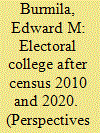

|
|
|
|
|
| Publication |
2009.
|
| Summary/Abstract |
The combined effects of an aging population, domestic migration, and the geographically heterogeneous effects of foreign immigration are producing politically significant changes in the distribution of the American population. Using statistical projections of state populations in the 2010 and 2020 US Censuses combined with statewide estimates of the normal vote based on the last five presidential elections (1992-2008), I show that by 2024 Republican presidential candidates will receive a net benefit of at least eight electoral votes due to the declining population of the Northeast and upper Midwest relative to the rapidly-growing Sun Belt. Democratic presidential candidates will find it increasingly difficult to win elections without having some success in the South and Southwest as Barack Obama did in 2008 but many previous candidates failed to do. While migration will also benefit some solid Democratic states such as California, on balance Republican presidential candidates are poised to benefit from the status of Sun Belt states as magnets for both foreign immigration and domestic migration from a retirement cohort of unprecedented size.
|
|
|
|
|
|
|
|
|
|
|
|
|
|
|
|
| 7 |
ID:
073368
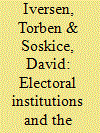

|
|
|
|
|
| Publication |
2006.
|
| Summary/Abstract |
Standard political economy models of redistribution, notably that of Meltzer and Richard (1981), fail to account for the remarkable variance in government redistribution across democracies. We develop a general model of redistribution that explains why some democratic governments are more prone to redistribute than others. We show that the electoral system plays a key role because it shapes the nature of political parties and the composition of governing coalitions, hence redistribution. Our argument implies (1) that center-left governments dominate under PR systems, whereas center-right governments dominate under majoritarian systems; and (2) that PR systems redistribute more than majoritarian systems. We test our argument on panel data for redistribution, government partisanship, and electoral system in advanced democracies.
|
|
|
|
|
|
|
|
|
|
|
|
|
|
|
|
| 8 |
ID:
081530
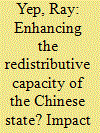

|
|
|
|
|
| Publication |
2008.
|
| Summary/Abstract |
Many observers contend that fiscal deprivation of the centre in reform China is detrimental to the overall capacity of the Chinese state, and thus the danger of national disintegration cannot be discarded. One relevant concern here is the obligation of the state to redress socio-economic dislocations, of which growing regional inequality is a major issue. The Tax Sharing Scheme introduced in 1994 represents the most colossal effort to redress the centre-local imbalance. The analysis of the patterns of income and expenditure of county finance between 1993 and 2002, however, highlights the many facets of state capacity and reiterates the possibility of state involvement amidst an improved fiscal position. The success in extractive capacity in this case does not guarantee parallel improvement in the central government's redistributive capacity. Analysis of local expenditure patterns shows that the growing support of the centre simply fails to reverse the declining level of local services in areas that may be targeted as key for poverty alleviation and equalization. The danger of the simple reading of the rise in extractive capacity attributed to the 1994 reform as a symptom of a strong central state is evident.
|
|
|
|
|
|
|
|
|
|
|
|
|
|
|
|
| 9 |
ID:
111906


|
|
|
|
|
| Publication |
2012.
|
| Summary/Abstract |
Explanations of different patterns of preferences for redistribution either highlight the role of the institutional framework in a country or highlight the importance of self-interest and rational expectations. The study introduces a unified approach to explain differences in preferences for redistributive measures for the case of intergenerational monetary transfers for families and children. Both explanatory approaches are integrated into the action-based Model of Frame Selection that incorporates normative motives and economic self-interest into the process of decision making. Using a large sample that deals with questions on the approval of public policies for families and accounts for the normative importance of children and family life in Germany, evidence is provided that both approaches are valid in explaining preferences for government transfers.
|
|
|
|
|
|
|
|
|
|
|
|
|
|
|
|
| 10 |
ID:
105221
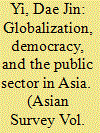

|
|
|
|
|
| Publication |
2011.
|
| Summary/Abstract |
In this era of globalization, does democracy in Asia have a mediating impact on a country's public sector? As the first empirical analysis focused solely on Asian countries, this paper finds that, in general, democracies are associated with a larger government. In particular, democracies more exposed to the global trade have larger public economies. This is not the case, however, in democracies more dependent on foreign direct investment.
|
|
|
|
|
|
|
|
|
|
|
|
|
|
|
|
| 11 |
ID:
189541


|
|
|
|
|
| Summary/Abstract |
The Journal of Palestine Studies’ special issue on infrastructure, environment, and health in Palestine sheds new light on the conditions and possibilities of politics. Although it is commonly viewed as “an entity ostensibly separate from technology and other human constructions,” the environment is in fact a particular configuration of “socio-technical arrangements.” The special issue’s four articles and two reflection essays—by Nadi Abusaada, Leena Dallasheh, Samir Harb, Cristina Violante, Nimrod Ben Zeev, and Emily McKee—span historical periods from Ottoman-ruled Palestine to the contemporary era. Hailing from the fields of history, architecture, anthropology, and legal theory, the contributors draw on original archival, spatial, and ethnographic research to parse the realities, experiences, and lessons that Palestine offers beyond its status as a site of settler-colonial deprivation and toxicity. Together they demonstrate that infrastructure, environment, and health are fundamentally and irrefutably political.
|
|
|
|
|
|
|
|
|
|
|
|
|
|
|
|
| 12 |
ID:
092118


|
|
|
|
|
| Publication |
2009.
|
| Summary/Abstract |
In this article, I highlight a rhetorical strategy in Machiavelli's Discourses through which: (1) the Florentine endorses, despite appearances to the contrary, the redistributive agenda of the Brothers Gracchi, Roman tribunes frequently blamed for causing the collapse of the Republic; and (2) subtly intimates the violent means that other prospective reformers of republics must employ to succeed where the Gracchi had failed. Machiavelli invokes 'prudence' in his passages devoted to the Gracchi; following this lead, I accentuate the form of prudential rhetoric that he practices in such passages, and I point to the prudential form of violence he thought necessary if republics were to, in his words, 'keep the public rich, and the citizens poor'.
|
|
|
|
|
|
|
|
|
|
|
|
|
|
|
|
| 13 |
ID:
167620


|
|
|
|
|
| Summary/Abstract |
Western societies have experienced a broadening of inclusive membership, whether we consider legal, interpersonal, or cultural membership. Concurrently, we have witnessed increased tensions around social citizenship, notably harsher judgments or boundaries over who “deserves” public assistance. Some have argued these phenomena are linked, with expanded, more diverse membership corroding solidarity and redistribution. We maintain that such a conclusion is premature and, especially, unsatisfactory: it fails to detail the processes–at multiple levels of analysis–behind tensions over membership and social citizenship. This essay draws on normative political theory, social psychology, cultural sociology, and political studies to build a layered explanatory framework that highlights the importance of individual feelings of group identity and threat for people's beliefs and actions; the significance of broader cultural repertoires and notions of national solidarity as a source and product of framing contests; and the diverse ways elites, power, and institutions affect notions of membership and deservingness.
|
|
|
|
|
|
|
|
|
|
|
|
|
|
|
|
| 14 |
ID:
178815


|
|
|
|
|
| Summary/Abstract |
China is undergoing an energy-market reform while the residential sector remains the most prudent for its close relationship with livelihood. Based on the Chinese household energy consumption survey, a demand function is established to estimate the determinants of residential electricity consumption. With a micro-model, the changes in welfare and redistribution under different scenarios are estimated. From the results, the current subsidy is ineffective; each high-income family receives the cross-subsidy of 35.65 CNY per month, which is 3 times of the low-income family. Price increment leads to less subsidy and deadweight loss but a loss in welfare, and the adjustment in the price on the 1st block is more conducive to the subsidy decline. With a similar overall effect, the non-uniform increase is more effective in subsidy redistribution by widening the price gradients between IBP (increasing block price) blocks and is recommended. Considering the burden of subsidy, the government and the power grid companies are suggested to clarify the pricing scheme to help the public get informed, and thereby, win the support of the public in the energy reform.
|
|
|
|
|
|
|
|
|
|
|
|
|
|
|
|
| 15 |
ID:
097820
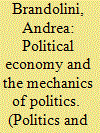

|
|
|
| 16 |
ID:
174768


|
|
|
|
|
| Summary/Abstract |
The European Union provided a mixed response to the 2008 financial crisis. On the one hand, it refused to pursue fiscal integration through a common budget; on the other, it introduced significant transfers between countries that were designed to produce financial stabilization. The authors analyze this response as the outcome of democratic constraints on EU leaders. Given the EU’s current institutional structure, citizens’ preferences pose a binding constraint on what leaders can do as these preferences limit the scope of risk-pooling among members and the degree of political tolerance for different courses of action. The authors show that citizens’ preferences reflect differences in the geography of income, production regimes, and institutional organization. The heterogeneity of constituencies’ redistribution preferences combined with a diverse economic geography helps to explain why political constraints on national governments prevent them from engaging in further fiscal integration. By contrast, externalities among member states shift the preferences of citizens who may experience negative effects and make international redistribution politically feasible. The authors analyze these two mechanisms and present novel empirical results on the determinants of preferences for fiscal integration and international redistribution in the aftermath of the eurocrisis.
|
|
|
|
|
|
|
|
|
|
|
|
|
|
|
|
| 17 |
ID:
173007


|
|
|
|
|
| Summary/Abstract |
Rising inequality has caused concerns that democratic governments are no longer responding to majority demands, an argument the authors label the subversion of democracy model (sdm). The sdm comes in two forms: one uses public opinion data to show that policies are strongly biased toward the preferences of the rich; the other uses macrolevel data to show that governments aren’t responding to rising inequality. This article critically reassesses the sdm, points to potential biases, and proposes solutions that suggest a different interpretation of the data, which the authors label the representative democracy model (rdm). After testing the sdm against the rdm on public opinion data and on a new data set on fiscal policy, they find that middle-class power has remained remarkably strong over time, even as inequality has risen. The authors conclude that the rich have little influence on redistributive policies, and that the democratic state is apparently not increasingly constrained by global capital.
|
|
|
|
|
|
|
|
|
|
|
|
|
|
|
|
| 18 |
ID:
099087
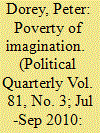

|
|
|
|
|
| Publication |
2010.
|
| Summary/Abstract |
Inequality in Britain today is now so deep that the top 10 per cent own 100 times more than the bottom 10 per cent, yet there is remarkably little public concern or anger about poverty. Indeed, compassion and concern for the poorest in society has actually declined in recent years due to the continued, and even increased, prevalence of the view that poverty is largely caused by laziness and lack of willpower, or is simply an unavoidable fact of modern life. Either way, many people tacitly accept that 'the poor will always be with us'. Moreover, much of the British public believes that there are sufficient opportunities to succeed for those who try hard enough, and also that it is the middle class which actually struggles the most, economically or financially. These assumptions are highly conservative in their ideological and political implications because they limit public support for egalitarianism and extensive wealth redistribution from rich to poor.
|
|
|
|
|
|
|
|
|
|
|
|
|
|
|
|
| 19 |
ID:
125798


|
|
|
|
|
| Publication |
2013.
|
| Summary/Abstract |
Energy and climate policies are usually seen as measures to internalize externalities. However, as a side effect, the introduction of these policies redistributes wealth between consumers and producers, and within these groups. While redistribution is seldom the focus of the academic literature in energy economics, it plays a central role in public debates and policy decisions. This paper compares the distributional effects of two major electricity policies: support schemes for renewable energy sources, and CO2 pricing. We find that the redistribution effects of both policies are large, and they work in opposed directions. While renewables support transfers wealth from producers to consumers, carbon pricing does the opposite. More specifically, we show that moderate amounts of wind subsidies can increase consumer surplus, even if consumers bear the subsidy costs. CO2 pricing, in contrast, increases aggregated producer surplus, even without free allocation of emission allowances; however, not all types of producers benefit. These findings are derived from an analytical model of electricity markets, and a calibrated numerical model of Northwestern Europe. Our findings imply that if policy makers want to avoid large redistribution they might prefer a mix of policies, even if CO2 pricing alone is the first-best climate policy in terms of allocative efficiency.
|
|
|
|
|
|
|
|
|
|
|
|
|
|
|
|
| 20 |
ID:
183233


|
|
|
|
|
| Summary/Abstract |
It is widely assumed that authoritarian states tend to use repression to suffocate social conflicts that threaten regime stability. Focusing on the Chinese state's responses to resource conflict, a particular type of social conflict triggered by mineral resource extraction, this research argues that authoritarian regimes may prefer to use redistributive policies to defuse social unrest under certain circumstances. Through mixed methods combining qualitative research and statistical analysis, I find that local governments in resource-rich regions do not spend heavily on coercive state apparatus. Instead, they generously hand out social security benefits to appease aggrieved citizens. Furthermore, the Chinese state actively involves mining companies in the redistribution process and requires them to share the financial costs of relief policies. Therefore, when conflicts arise between specific social groups with conflicting interests, redistribution may be a more effective strategy to preserve regime stability.
|
|
|
|
|
|
|
|
|
|
|
|
|
|
|
|
|
|
|
|
|